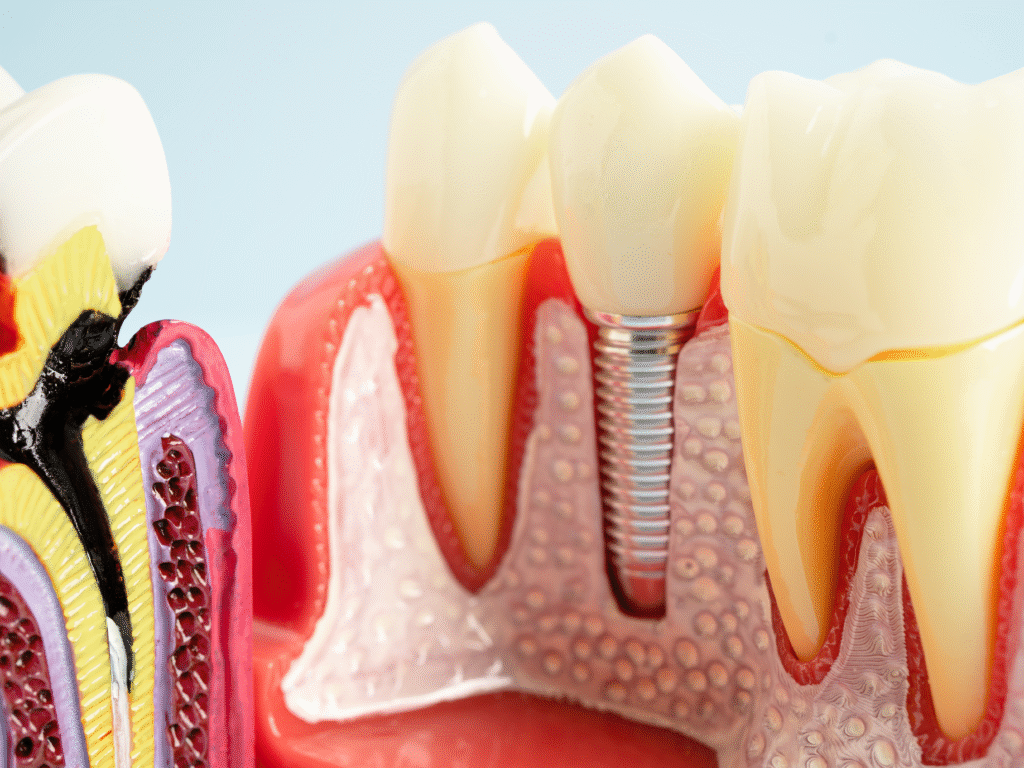
Dental problems can be painful and long-lasting. So when the patients go to the dental clinics, dentists offer solutions for their patients. The dental implant procedure is one of the solutions offering a long-term solution for a missing tooth of the patient. Although it is proven that dental implants have a high success rate, sometimes there can be complications. These dental implant problems can also stay for a longer time and become chronic. So it is always better to be aware of these dental implant problems. Then you can talk them out with your dentist to figure them out or decide what?s the best implant solution for you.
What is a Dental Implant Shortly?
Dentists suggest dental implants when the patient is complaining about the missing tooth. The implant is actually a titanium screw that is placed onto a patient’s jawbone by the dental surgeons. The procedure takes several weeks until the implant and jawbone integrate. Afterward, the implant is strong enough to hold a tooth or crown on top of itself.
Dental implants are quite a popular treatment offered by dentists and they are gaining more popularity every day. But there are some complications and potential long-term problems associated with the dental implant. Now, we are going to look at what the dental implant problems are and how serious they are.
Common Dental Implant Problems
Infection, gum recession, loose implant, and nerve or tissue damage are the common dental implant problems that may occur following the dental implant procedure.
Infection
After the surgery, patients should be careful about their dental implant?s hygiene and maintenance. In this way, patients can avoid one of the most common dental implant problems; infection. Patients should employ their surgeon?s advice on the maintenance of the implant.
If an infection occurs, the patient should seek dental help. Dentists provide treatment depending on the severity of the infection. They can suggest their patients use antibiotics or soft tissue graft if a bacterial infection is in the gum. Or, they can remove the infected bone tissue and maybe even implant if a bacterial infection occurred in the bone.
Gum Recession
If patients experience erosion in the gum tissue around the implant, it is called gum recession. They can feel pain caused by inflammation. An immediate dentist appointment is imperative. Otherwise, the dental surgeons would need to remove the implant.
Loose Implant
Osseointegration is the process when the dental implant is placed into the jawbone and fuse with it. Following the first few weeks after the dental implant is placed, osseointegration starts to process. This is an incredibly important process of the whole procedure since it ensures the success of the implant. Osseointegration takes up to several months.
But even after some months, if the implant could not fuse with the jawbone, the dental surgeon may decide to remove the implant completely. Since this process is the essence of the durability of the implant, it is imperative to be fused together. If the patient decides to go under the dental implant procedure again, they can start the process all over again after the area is completely recovered.
Nerve or Tissue Damage
If the dental surgeon places the implant too deep into the jawbone, it will be undesirably near to the nerve. This may cause tingling, pain, and numbness in the area. This will decrease the life quality of the patients. So the patients experiencing these dental implant problems should immediately contact their dental professional.
The dentists will examine the cause of the problem. Injury to the inferior alveolar nerve ( IAN) might be notably problematic. Patients might experience these symptoms caused by the inferior alveolar nerve; constant numbness from the implant side, along with the lower lip and chin; constant pain; tingling, tickling, or flaming sensations in the gums. The dentists will cure this type of dental implant problems according to the symptoms of the patients.
Less Common Dental Implant Problems
Dental implant procedures might cause some less common dental implant problems including sinus issues and deterioration of the implant.
Sinus Issues
If the upper jaw dental implant penetrates into the sinus cavities, swelling in the sinuses might occur, commonly known as sinusitis. Sinusitis might give the patient the following symptoms; pain, tenderness or swell over the cheeks, forehead, and eyes; green nasal mucus; a blocked nose; headaches; toothache; bad breath; fever.
Damage from Excessive Force
If the patient knowingly or unconsciously applies excessive force to their dental implant, they might damage or lose the implants. Grinding and bruxing are good examples of unconscious applied forces to the implants, especially when the patient?s asleep. If this type of behavior is constant, the patients need to wear a mouth shield, so that any damage might be prevented before occurring.
Long-Term Dental Implant Problems
Besides the short-term or minor dental implant problems, there are some long-term issues. Peri-implantitis and rejection of the body are the most important ones of the long-term dental implant problems.
Peri-implantitis is one of these long-term dental implant problems. Initially, it is a type of gum disease generating a loss of the bone holding the implant. Peri-implantitis happens because of the constant inflammation around the implant. The process of this problem is not short-time. It can take up to 5 years to advance and experience the symptoms, like bleeding or swelling around the dental implant.
Even though it can be rare, the body might reject the dental implant. Titanium or other materials that are used in dental implants are normally not harmful to the body. But some people might have sensitivity towards these materials and their bodies might reject the dental implants. So it is always better to have a sensitivity test if the patient is vulnerable to one of those materials.
You can read our previous post on https://smileteamturkey.com/blog/dental-crowns-guide-in-turkey/
